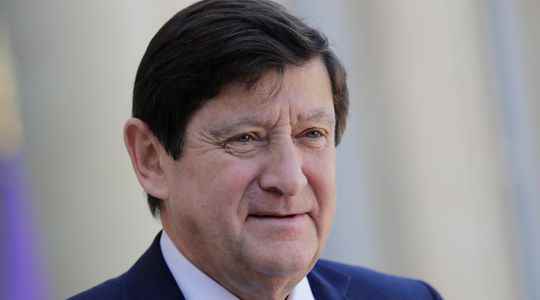Pressure boost for French athletes. During a reception given Monday evening at the Élysée to “celebrate” the Olympic medalists of the Tokyo 2021 Olympic Games, Emmanuel Macron did not hesitate to set much more ambitious objectives for 2024, the year in which the Games will take place “in home”, in Paris. While the French team won 33 Olympic medals in Japan this summer – against 42 in Rio in 2016 – the Head of State wanted to be firm, indicating that “the balance sheet is not quite that [qu’il] was waiting”.
In 2024, French athletes will have to do “much more”, he insisted, referring to the objective of integrating the “top 5” of the Olympic ranking. Emmanuel Macron also added that the State would not fail to support French athletes, recalling that efforts will be concentrated on “disciplines with high potential”. “The success of the Games will be the success of our athletes, because it works like that,” he insisted, before decorating the athletes present with the Legion of Honor or the National Order of Merit.
A “surprising” speech on the substance and on the form, judges the former Minister of Sports and Senator (PS) of the North Patrick Kanner. “When you want to win medals at the Olympics, you have to give yourself the means,” he says. “And not shirk responsibility by pointing the finger at athletes as the only culprits for the mediocre results of the Tokyo Olympics”. Interview.
THE EXPRESS. How do you interpret Emmanuel Macron’s speech to the medal-winning athletes in Tokyo on Monday evening?
Patrick Kanner. I think there is both a form of lucidity and a certain denial in this discourse. On the form, first of all, I think that blaming medal-winning athletes for the lack of victories of their non-medal-winning brothers and sisters was a somewhat curious method. On the merits, then, it must be admitted that the results of the Tokyo Olympics are quite mediocre. But how to ask athletes to improve it in 2024, when we see that, for four years, nothing has been done to give ourselves the means to shine? It is a double-edged sword: Emmanuel Macron realizes that the results of Tokyo are insufficient, but does not draw the consequences on the policy pursued by his government in the sports sector. The truth is that the soft power and prestige represented by the organization of the Olympic Games in France would have required exceptional means that neither Laura Flessel nor Roxana Maracineanu obtained.
What measures should be put in place to ensure French excellence in 2024?
Before coming to the treatment, it is first necessary to establish a true diagnosis. The ideal would be to make a general statement of French sport: how many investments have been missed, what are the priorities of the sector, how to aim for the “top 5”? When we know that our country is going to host a competition as prestigious as the Olympic Games, we must first find extraordinary resources, and this has not been the case so far – starting with the dismantling of the Ministry of Sports , with the creation of the National Sports Agency in 2019, approved by the government. This example is a good illustration of the absence of a political project for the sector: when one aims for excellence, why place the Ministry of Sports under the supervision of the Ministry of National Education? What is the sign sent to professionals, three years from the Paris Olympics?
Then, you have to invest massively. In amateur sport, in local clubs, in training, in equipment, in university sport, in order to give ourselves the means to discover future Olympic champions, then to train them. In this sense, the state has its share of responsibility. In recent years, hundreds of subsidized jobs have disappeared in the sector, for example, and with them the discovery of young nuggets in a local club or in the local neighborhood team. It is absolutely necessary to strengthen the state apparatus, because nothing can be done without the support of local elected officials, in particular regional presidents, who have become managers of the Centers for Resources, Expertise and Sports Performance [CREPS] since 2016.
Finally, it is obviously necessary to rely on human resources, in particular through the training of educators, coaches and sports advisers: this requires significant investment, for example by deploying high-level trainers to all clubs, and by offering them acceptable and attractive jobs.
For 2024, what do you think of the strategy mentioned by Emmanuel Macron to focus on “disciplines with high potential” for medals?
There are indeed disciplines where France has always shone, such as athletics, wrestling, boxing… But there is a gap between rhetoric and reality, with, once again, a lack of investment. We have to make a point with the presidents of the Federations, see where to increase the efforts so as not to end up in the middle of the ranking in these sports.
Is there still time to reverse the trend before the Paris Olympics?
It’s a race against time, but this awareness is a good thing. Discovering and training an Olympic champion does not happen overnight. The athletes we currently have are capable of mobilizing, they only ask for that, but they must have someone in front of them who shows them that they are the priority. And for the moment, there has been a form of laxity on the subject. In an exceptional situation, it is now necessary to provide exceptional means, and to make French sport a national priority. Three years from the Olympics, the time has come to make real budgetary efforts to promote Olympic excellence.
